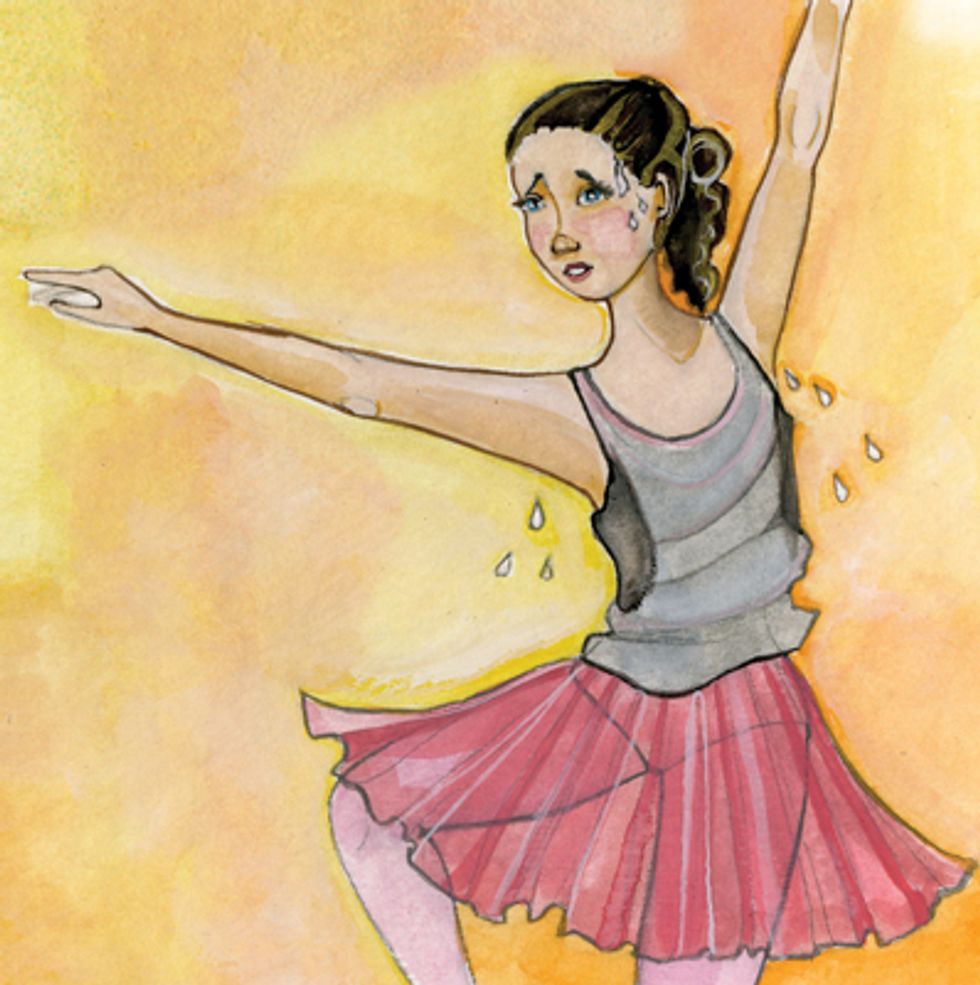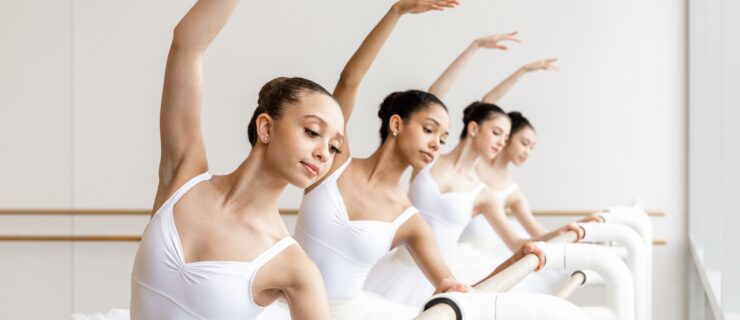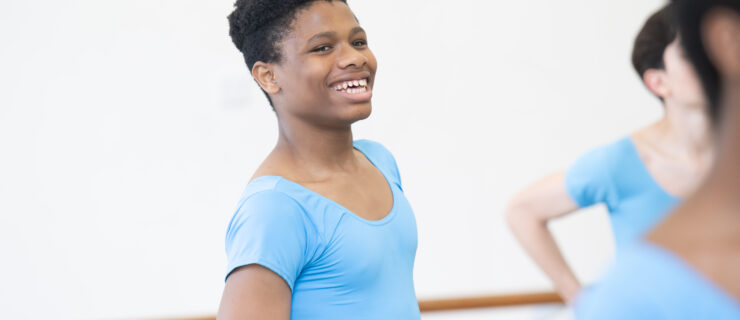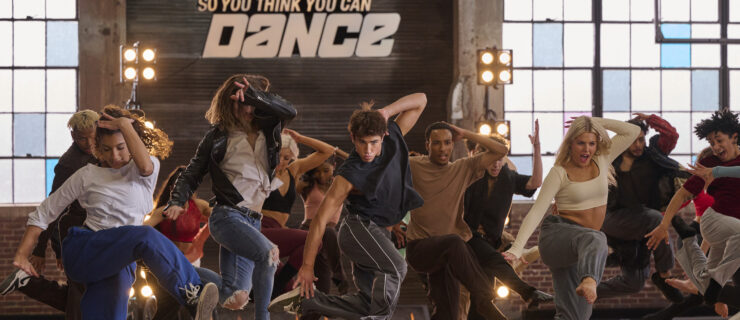Awkward Body Basics

Illustrations by Lealand Eve
You always work hard in dance class, but lately, you’ve been a little distracted. During port de bras, you worry about whether your deodorant is working. By petit allegro, you’re sure everyone is staring at your sweat stains. And what if your dance crush sees that giant zit between your shoulder blades?
It can be embarrassing to bring these kinds of issues up with your parents, your teachers or even your friends. You want to fix them—but you don’t want to talk about them. To help you shift your focus back to your dancing, DS spoke to three physicians to find out how to deal.
Excessive Sweat
“Healthy people sweat!” says Dr. Lori Baxter, a pediatrician in Maryville, TN. “Sweating helps maintain body temperature, hydrates skin and helps the body balance fluids and salts.” All of these functions are vital for dancers, whose artistic performance depends upon the body working at its best.
Of course, some people naturally sweat more than others. If you’re feeling self-conscious, you have a few options. Make sure the deodorant you buy includes an antiperspirant component—deodorant alone will not prevent sweating. You can even use a basic deodorant/antiperspirant on locations other than your armpits (for instance, if you tend to sweat beneath your breasts). If you sweat even when you’re cold or inactive, you might have a condition known as hyperhidrosis, where the sweat glands are overactive. In such cases, your doctor can recommend a prescription antiperspirant, such as Drysol.
Body Odor
Sweat by itself doesn’t smell, but it contributes to body odor in a major way. Body odor is produced by bacteria that grow on your skin, particularly in warm, moist areas. Just as some people sweat more than others, some people are genetically predisposed to experience body odor. BO can also be influenced by your lifestyle and diet. Dr. Nicole Carignan, a trained ballet and modern dancer who is now an anesthesia resident at Emory University Hospital in Atlanta, points out that the scents of potent foods like garlic and onions can actually be excreted through your skin, for instance.
Aside from using deodorant and antiperspirant, the biggest key to preventing body odor is good hygiene. If possible, shower immediately after class or rehearsal, and put on clean clothes. If you can’t shower right away, change into dry clothes. Sweaty, dirty clothing can harbor bacteria, so wash your leotards and tights in between wears. Finally, shaving your underarms regularly can help decrease both sweat and odor.
Body acne has the same cause as facial acne: clogged pores. And just like facial acne, body acne can be more rampant during puberty because of the sudden increase in hormones. Luckily, the same hygiene regimen that helps fight body odor can help you conquer body acne, as well.
In addition to showering after dancing and making sure not to re-wear dirty dance clothes, try using an exfoliating body scrub or a loofah to remove the dead skin cells that clog pores. “Use a gentle scrubbing motion,” Carignan says, “rather than scrubbing so hard you irritate the skin further.” She also recommends seeking out acne-treatment body washes that contain salicylic acid or benzoyl peroxide. The former slows the shedding of skin cells that can clog pores. The latter actually kills the bacteria that can cause acne and helps remove excess oil and skin cells from the skin. Acne-treatment products can dry out your skin, so always moisturize after washing, and stay hydrated by drinking lots of water.
Avoid picking at acne—scratching or popping zits can lead to scarring. Also, avoid covering acne in heavy makeup that will only clog pores further. If you must cover up pimples for a performance or special occasion, use a concealer that has salicylic acid in it.
Cold Sores
Cold sores around the mouth are caused by the herpes simplex type 1 virus, and can be triggered by stress, illness and overexposure to the sun or cold weather. Herpes type 1 is transmitted via saliva and other bodily fluids, often through breaks in the skin near or in the mouth. Don’t confuse this virus with herpes type 2, which causes genital lesions and is transmitted through sexual intercourse; the viruses are related, but they aren’t the same.
The good news is that most cold sores will heal on their own in a week to 10 days. You can speed up the healing time slightly with over-the-counter or prescription creams and ointments, such as Abreva. To avoid recurrences, learn and manage your triggers. For instance, if you get cold sores following sun exposure, always apply sunscreen and lip balm before going out.

The bad news: “Once you have the virus, you can never get rid of it. It just goes dormant,” says Dr. Brad Moser, founder and director of the Minnesota Dance Medicine Foundation in Minneapolis. Because the virus can stay dormant for long stretches, you may not know who in your class or studio has it. As a general rule, avoid sharing water bottles, straws, utensils, face towels and makeup with other dancers.
Stretch Marks
Stretch marks are striped lines on your skin that are lighter or darker than your skin tone. They’re a form of scarring that sometimes occurs when rapid growth leads to sudden stretching of the skin. Having them doesn’t mean you’re overweight. You may see them crop up after a growth spurt, if your skin couldn’t quite keep up with your increase in height. Moser points out that you might also see stretch marks following weight loss, as the skin that was stretched has less mass to cover.
If the marks show in a costume, apply concealer. While there are creams on
the market that say they’ll diminish or eliminate stretch marks, Baxter, Moser and Carignan all stress that these methods aren’t proven to work.
Cellulite
Cellulite consists of bumps and lumps in the layer of fat right beneath the skin. Like stretch marks, cellulite occurs even in thin, athletic people; having cellulite does not mean you need to lose weight. Whether you develop this dimpled-looking skin on your thighs and stomach will primarily be dictated by genetics. However, Moser notes that other factors, such as poor diet and dehydration, can contribute to the appearance and severity of cellulite. Hormonal changes, such as those that occur during puberty or when you have your period, can also increase the appearance of cellulite.
As of now, there is no proven “cure” for cellulite. “Even liposuction goes for the deep fat, rather than this surface fat,” Moser says. “Liposuction can actually make cellulite worse!”
In each of these situations, the biggest key is to remember that you aren’t alone. Your classmates are probably experiencing some of the same insecurities—and your teachers and choreographers have been through it, too. “Dancers are insecure in general,” says Carignan, “given that we grow up in front of mirrors. But you have to work toward accepting your body the way it is. Learn to minimize the things that embarrass you, and know that most of those things are normal.” And they have nothing to do with your dancing.
(The secret to combating many of these issues? Hydration. If you drink plenty of fluids, your body will flush out toxins, your skin will be more elastic (fewer stretch marks!) and you may be able to minimize the appearance of cellulite. Drink up!)





